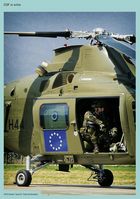You are here
Flexibility for ESDP: what is feasible, what acceptable, what desirable?

During the seminar, participants underlined in particular the positive evolution of the ESDP-related articles in the draft constitutional Treaty and emphasised the need for some form of ‘agreed’ flexibility in this domain, that is to say one capable of combining legitimacy and effectiveness without engendering exclusion or, conversely, frustration amongst the member states.
Session 1: Introductory Session
Chair: Nicole Gnesotto (Director, EUISS, Paris)
Introduction: Where we stand
Speaker: Antonio Missiroli (EUISS, Paris)
Comments: Françoise de la Serre (CERI, Paris), Rafal Trzaskowski (Natolin European Centre, Warsaw) Session 2: 'Assets and capabilities'
Chair: Mathias Jopp (Director, IEP, Berlin)
Introduction: The military dimension
Speaker: Jean-Yves Haine (EUISS, Paris)
Introduction: The armaments dimension
Speaker: Burkard Schmitt (EUISS, Paris)
Comments: Daniel Keohane (CER, London), Pascal Meunier (Thales, Brussels) Session 3: ‘Missions and operations’
Chair: Rob de Wijk (Leiden University, Royal Netherlands Military Academy and Clingendael)
Introduction: Post-Petersberg
Speaker: Martin Ortega (EUISS, Paris)
Introduction: The operational acquis
Speaker: Antonio Missiroli (EUISS, Paris)
Comments: Pär Eriksson (Swedish Defence Research Academy, Stockholm), Jiri Sedivy (Institute of International Relations, Prague) Session 4: Conclusions
Chair: Nicole Gnesotto (Director, EUISS, Paris)
The way ahead
Speaker: Philippe de Schoutheete (European Commission, Brussels)